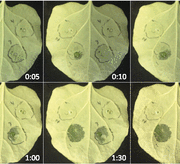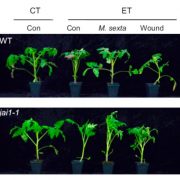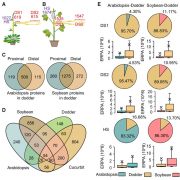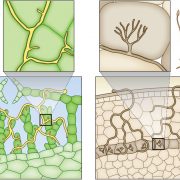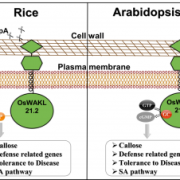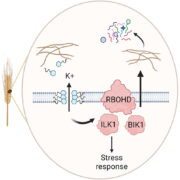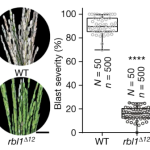Shifting microbial communities can enhance tree tolerance to changing climates
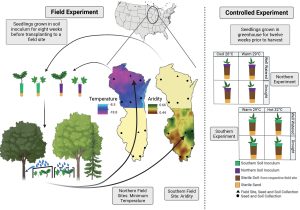 Like all of Earth’s lifeforms, plants are already experiencing hardships due to the changing climate, and these stresses will get more extreme. Much effort has gone into breeding crops for climate resilience, less on trees which are both more diverse and less genetically tractable. Here, Allsup et al. provide an interesting approach to enhance tree tolerance to climate change, by altering their soil microbial communities. Previous studies have demonstrated that specific microbiomes can enhance plant stress resilience. In this study, the authors collected soil from 12 sites across two states (Wisconsin and Illinois), then used these to inoculate tree seedings of several species. The seedlings were transplanted to a northern (colder, wetter) field site or a southern (hotter, drier) field site, or grown in a greenhouse. Interestingly, inoculation with soil from drier sources conferred an advantage to the seedlings planted in the drier, more southerly site. In the northerly site under ambient rainfall conditions, seedling survival was optimized by preinoculation with microbial communities from colder sites. Although the authors say that “Intentional inoculation of specific microbial taxa into forests is not feasible at scale,” they do point out that most planted trees start their lives in nurseries, where it would be entirely feasible to provide them with a microbial cocktail designed to enhance their survival in their future home. (Summary by Mary Williams @PlantTeaching) Science 10.1126/science.adf2027
Like all of Earth’s lifeforms, plants are already experiencing hardships due to the changing climate, and these stresses will get more extreme. Much effort has gone into breeding crops for climate resilience, less on trees which are both more diverse and less genetically tractable. Here, Allsup et al. provide an interesting approach to enhance tree tolerance to climate change, by altering their soil microbial communities. Previous studies have demonstrated that specific microbiomes can enhance plant stress resilience. In this study, the authors collected soil from 12 sites across two states (Wisconsin and Illinois), then used these to inoculate tree seedings of several species. The seedlings were transplanted to a northern (colder, wetter) field site or a southern (hotter, drier) field site, or grown in a greenhouse. Interestingly, inoculation with soil from drier sources conferred an advantage to the seedlings planted in the drier, more southerly site. In the northerly site under ambient rainfall conditions, seedling survival was optimized by preinoculation with microbial communities from colder sites. Although the authors say that “Intentional inoculation of specific microbial taxa into forests is not feasible at scale,” they do point out that most planted trees start their lives in nurseries, where it would be entirely feasible to provide them with a microbial cocktail designed to enhance their survival in their future home. (Summary by Mary Williams @PlantTeaching) Science 10.1126/science.adf2027


